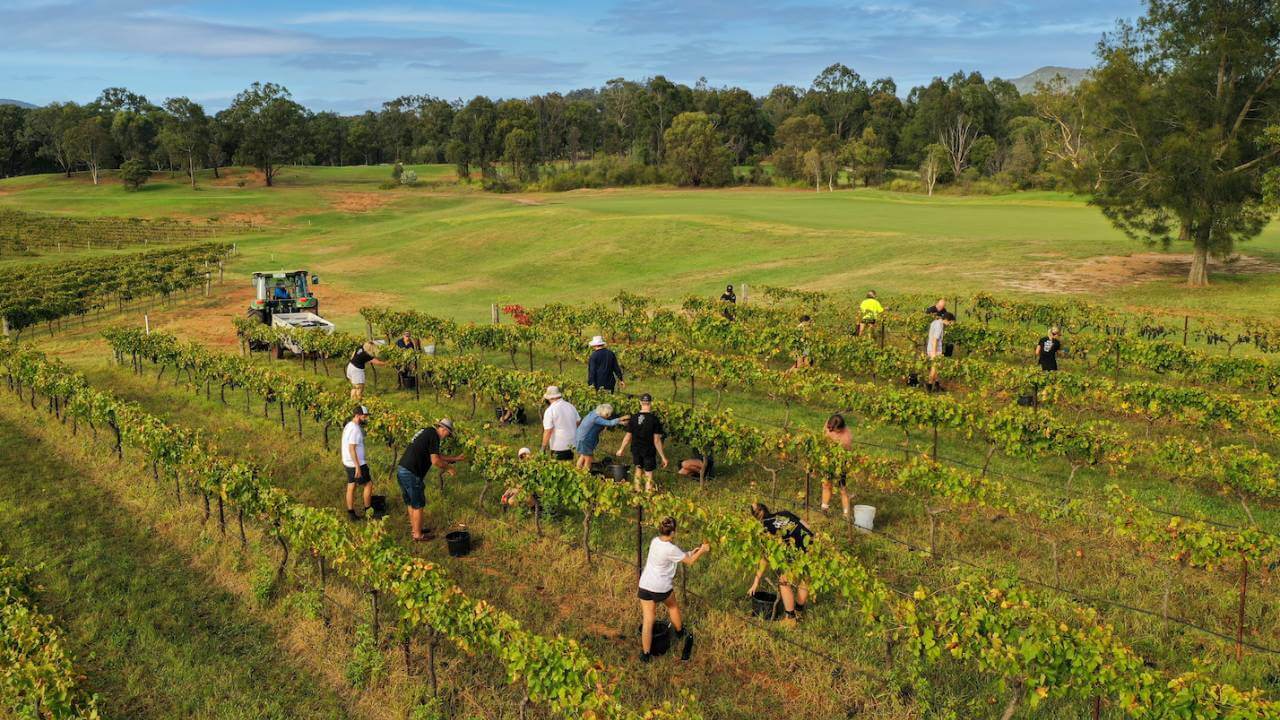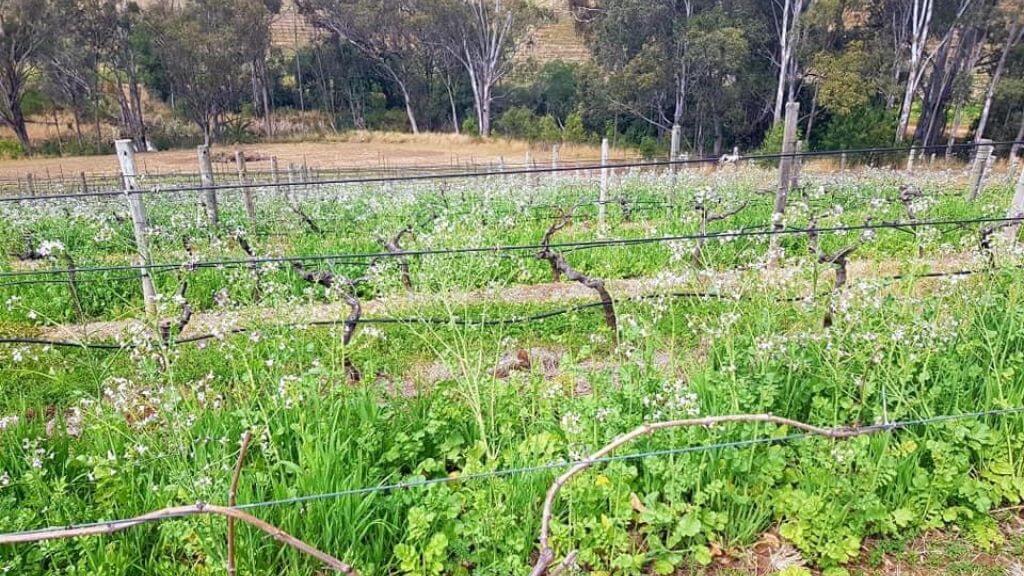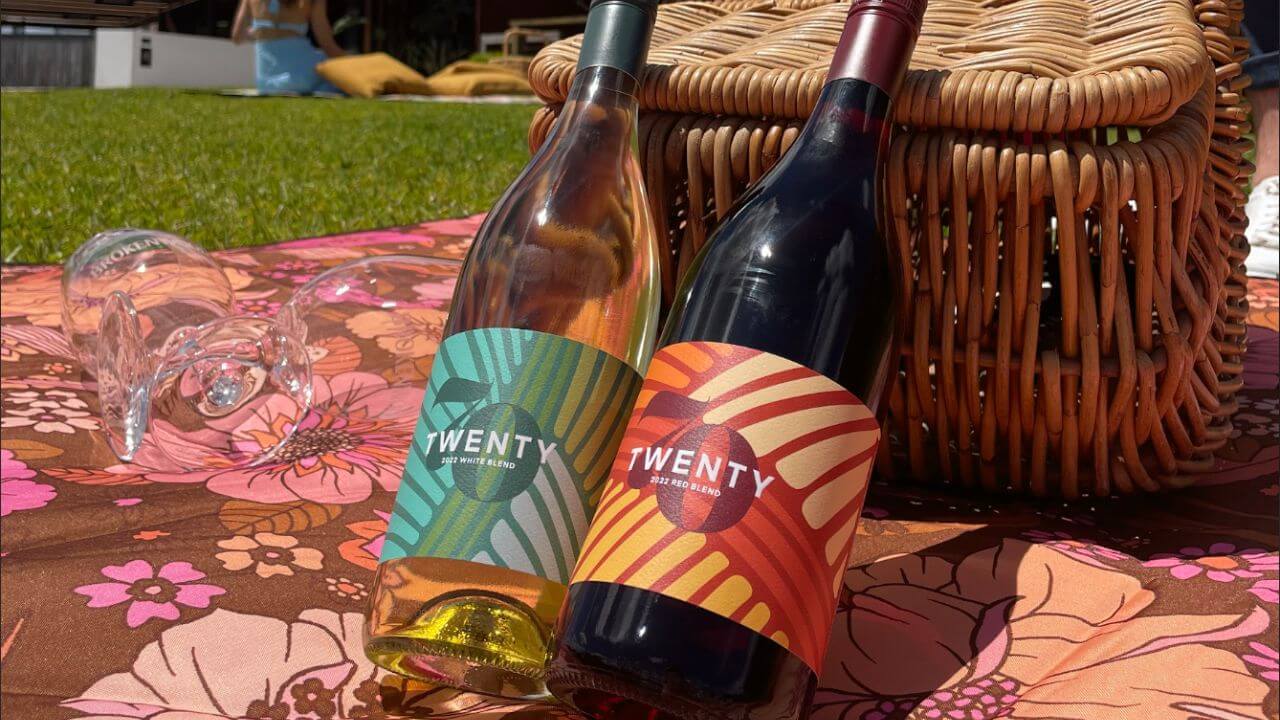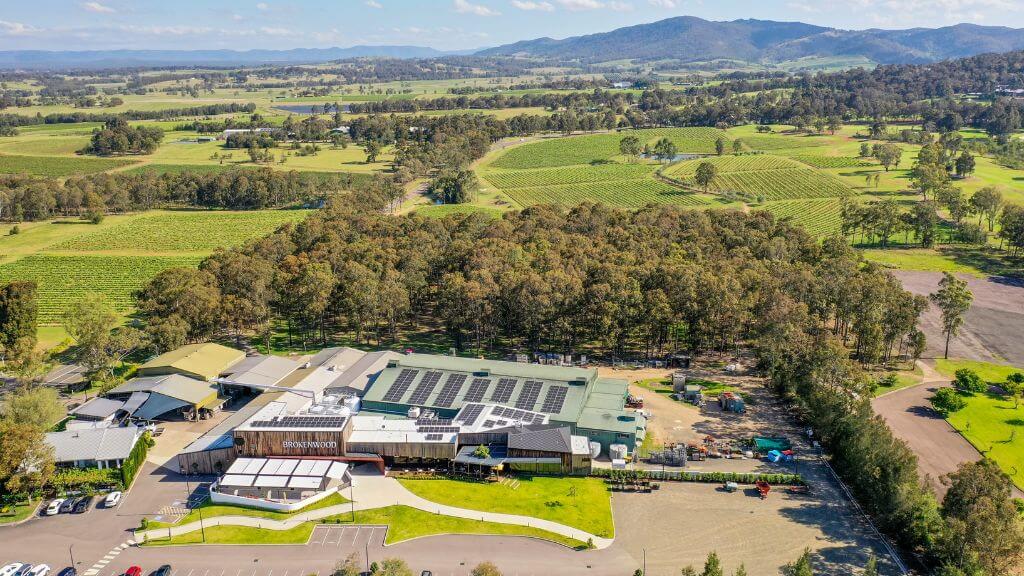Our Mission for Sustainable Winegrowing in Australia

As leaders of the Hunter Valley's sustainable wine movement, Brokenwood Wines is committed to producing high-quality wines that are not only delicious but also environmentally responsible.
Our dedication to sustainability is reflected in everything we do, from our land and soil management practices to our waste management and, of course, our kitchens. Here, we explore:
- What is sustainable wine?
- Brokenwood’s commitment to sustainable winegrowing in Australia
- Land and soil practices
- Waste management
- Water and energy conservation
- Sustainable cooking and restaurant management
- Our Twenty70 vegan wine range
What is Sustainable Wine?
Hint: it’s not simply wine that ages well and therefore lasts a very long time (though we do love this kind of wine). Sustainable winegrowing in Australia is a many-faceted area that’s garnering more and more attention, credibility and demand.
It’s developing rapidly nation-wide, and with so many competing environmental factors like floods and bushfires affecting our beautiful land, it's no wonder the winemaking industry is taking sustainability seriously.
We sit down with Brokenwood Lab and Sustainability Coordinator Lorrae St Vincent to explore exactly what our winery is doing to reduce its carbon footprint and invest in sustainable winemaking practices for the long run.
Sustainable Winegrowing in Australia
Sustainable wine is produced using environmentally friendly methods that prioritise the conservation of natural resources, the reduction of carbon emissions, and the promotion of biodiversity. This approach takes a holistic view of winemaking, recognising the interconnectedness of all aspects of the production process and the impact they have on the environment.
Brokenwood’s Commitment to Sustainability
When it comes to Brokenwood's mission towards sustainable winegrowing, Lorrae is our go-to girl. An irreplaceable asset to the Brokenwood team, Lorrae is responsible for ensuring that we implement sustainable practices across all areas of our winery.
'I look after chemical analysis, quality control, label integrity, waste management, water usage, kitchen sustainability, land and soil management practices,' Lorrae lists. 'I coordinate sustainability on-site in all departments. It's a big job, but so rewarding.'
Becoming a Certified Sustainable Winery
Lorrae's efforts don't go unnoticed, to say the least. Our sustainability practices at Brokenwood Wines have been recognised by Sustainable Winegrowing Australia, and we became an SWA Certified Sustainable Winery in June 2022. This certification demonstrates our commitment to the environment and to producing wines that are not only high quality but also sustainable.
‘We decided to take the extra step and get certified starting with our owned and managed Hunter vineyards,’ Lorrae says. ‘Our Graveyard, Tallawanta, Mistress Block, Verona and Oakey Creek Vineyards are all certified now.’
This certification means Lorrae reports data annually, with a recertification audit required every 3 years for each vineyard site and the Winery itself. ‘It proves our credentials,’ she clarified. ‘A certification says, “You’re really doing what you’re saying.” It eliminates greenwashing and shows our industry and our customers that we’re serious about sustainable wine.’

Land and Soil Practices
One of the most important aspects of sustainable winegrowing is land and soil management. In our local Hunter Valley vineyards, we've made the commitment to look at ways to reduce the use of chemicals and pesticides and incorporate more organic material into our soil. The results? Happier vines, more delicious wines.
Promoting Biodiversity
Biodiversity is a key priority in the health and longevity of our Hunter Valley vineyards.
‘Our aim is to use less chemicals on the vineyards,’ Lorrae tells us. ‘Less pesticides, fungicides, insecticides, and incorporate more organic material into the soil to build up microbes, and ultimately for better nutrient cycling and availability for vine health.’
These microbes are designed to support the soil’s ecosystem, which in turn supports the vines, which means less chemicals and nasties added to the soil. This is achieved using a combination of compost (containing grape marc from pressed grape material & other organic materials) and mulch to try and encourage earthworms and retain soil moisture. Cover crops are also planted in the mid row of our vineyards to provide added benefits.
‘We plant oats & legumes to fix Nitrogen in the soil & we are trialling Native perennials such as Wallaby Grass, Rye Grass and Windmill Grass & groundcovers to bring in beneficial insects into the mid row and maintain ground cover all year round to prevent soil erosion and lock in moisture,’ says Lorrae.
‘The idea is to grow these crops in the mid row, promote biodiversity, and leave carbon and nitrogen for the vines to utilise as nutrients in the growing season in September.’
Integrated Pest Management
Lorrae has also instigated the planting of native biodiversity corridors in our Hunter Valley vineyards, which play a major role in the development of sustainable wine.
‘Biodiversity corridors provide a habitat for natural predators of vineyard pests and diseases,’ Lorrae explains. ‘A lot of research has been done around this by Dr Mary Retallack mainly in SA, it’s what we call integrated pest management.’
Research suggests that native shrubs and grasses provide habitat for soil-beneficial insects and predators like arthropods. ‘Things like lacewings naturally kill pests and diseases prevalent in vineyards for you,’ Lorrae says. ‘It’s our way of harnessing what’s naturally there for the benefit of our crops, and means we don’t need to resort to so many pesticides.’
Waste Management
Recycling, composting and mulching are a big part of Lorrae's job. Waste management is a two-pronged facet – it involves managing what Brokenwood discards, and processing what recycled materials get pulled back in for packaging.
‘We recycle our cardboard, glass, and are looking at ways to reduce our single use plastics. We do composting where we can,’ says Lorrae. ‘We're trying to be as responsible as we can with the waste we produce so that it gets reused or recycled where possible.’
This is particularly prevalent with our upcoming Twenty70 2023 vintage, which is set to use even more recycled packaging and lightweight glass to minimise Brokenwood’s carbon footprint and contribute to sustainable winegrowing Australia wide.
Water and Energy Conservation
Water and energy conservation are also critical components of sustainable winegrowing.
'We've got moisture probes to monitor our water consumption in the Vineyard, and rainwater tanks to supplement town water usage,' says Lorrae. 'Then we've invested in energy-efficient practices like solar panels, LED lighting across the entire site, including our Cellar Door, and a major energy efficiency refrigeration upgrade in 2014.’
Everything works together to drive our mission towards sustainability. As an industry that must prioritise water and energy for crop growth and Cellar Door visitation respectively, consumption was a huge issue for our sustainability efforts.
New Technology Lessens Water Usage
'After the bushfires of 2020, we knew we needed to come up with a more sustainable water usage alternative,' says Lorrae.
In addition to our rainwater tanks, which hold 180,000 litres of rainwater combined, moisture probes have been installed into our Hunter Valley vineyards.
'The probes allow us to monitor the level of water in the subsoil and determine when irrigation is necessary,' explains Lorrae. 'It's great technology – it ensures that we use water efficiently and only when needed.'

Cooking With Sustainability in Mind
Under Lorrae's expert guidance, sustainability at our Cellar Door extends beyond wine production and, of course, into the kitchen.
Executive Chef Sean Townsend's approach to cooking is centred on eco-friendly practices and locally sourced ingredients. With Sean's help, Brokenwood has drastically minimised plastic use and reimagined our Cellar Door’s dining options with sustainable wine at the heart of its food and cooking.
‘Sean is very good with using cuts of meat that would normally not be used, and saving excess red wine from tastings to use as marinades,’ Lorrae says.
Sean has also revitalised our three Chef's Gardens plots, each of which grow various vegetables and herbs that make for indescribably good food at The Wood Restaurant.

Twenty70: Brokenwood’s Vegan Wines
Our commitment to sustainable winegrowing in Australia extends beyond vineyard management and into our winemaking practices.
Twenty70 is our first range of red and white wine blends marketed as strictly vegan wines. They're made and designed with eco-consciousness at the forefront, and the brand name reflects our 100 years of Brokenwood Wines.
‘[Twenty70 is] another step for us in pushing the boundaries of sustainability in winemaking, especially in the Hunter region,’ says Lorrae.
While all of our red wines at Brokenwood have naturally been vegan friendly since 2017, both in ingredients and winemaking practices, Twenty70 is the first line to be conceived, planned, planted and harvested with pure sustainability in mind.
‘The idea was to get the younger market involved,’ Lorrae explains. ‘Young people are invested in caring for the environment. They want to know where their wines come from, whether they’re made sustainably – they want to buy a product that’s good for the planet. And we wanted to meet that demand.’
You can read more about Twenty70’s vegan winemaking processes, eco-friendly ingredients and mission to unite old and new in our recent blog post here.

Discover the Best Sustainable Wine at Our Cellar Door
Our commitment to sustainable winegrowing in Australia is evident in our practices across the board. From land and soil management to water and energy conservation to waste management, we're always looking for ways to lessen our impact on the environment. It's a win-win for our wine lovers and for the planet.
Discover more about our mission for sustainable wine and winegrowing on our website.
Ready to see it all for yourself? Visit our Cellar Door to breathe in the fresh Hunter Valley air and see our impressive eco-friendly home thrive.